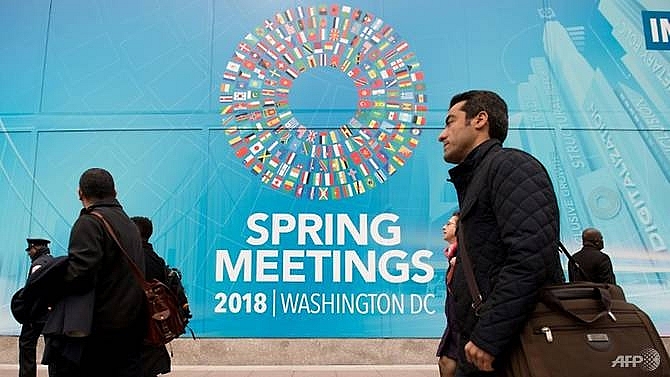IMF warns of risks as central banks tighten
 |
| The International Monetary Fund issues warnings about risky behaviour in global financial markets that could create problems as interest rates start to rise. (AFP/SAUL LOEB) |
The fund cautioned that investors and financial markets expect a steady approach to monetary tightening based on the belief inflation will remain relatively tame.
But the IMF pointed to some fragilities in global finance after a lengthy period of easy money policies and low interest rates, including a flood of high-risk bonds, record-high debt levels and lofty prices for risky assets.
If conditions change abruptly that could even derail the economic recovery, the fund warned.
"Financial vulnerabilities, which have accumulated during years of extremely low rates and volatility, could make the road ahead bumpy and could put growth at risk," the IMF said in its Global Financial Stability Report, a twice-annual analysis that also called for global coordination to regulate cryptocurrencies.
A sudden acceleration of inflation in the United States could lead the Federal Reserve to raise interest rates more quickly than currently expected, the report.
Tobias Adrian, director for the IMF's monetary and capital markets department, acknowledged in a press briefing that uncertainty about inflation is currently "very low," but warned that markets could have an outsized reaction to any spike.
"What we are flagging is that at some point markets see shocks in inflation that raise inflation uncertainty and when that happens, that is associated with a rise in long-term interest rates and that might lead to a tightening in financial conditions," he said.
Emerging markets would be especially vulnerable to "spillovers" if that happens, the report cautioned.
"Gradual and well-telegraphed" moves by advanced economy central banks have so far been favourable for emerging economies, but financial flows could fall by "at least one-quarter" if central banks mishandle the transition, the fund said.
The analysis is the latest to tackle the myriad policymaking challenges as the world moves towards ending a long period of low interest rates and monetary stimulus enacted after the 2008 financial crisis.
The US Federal Reserve has undertaken a series of interest rate hikes over the last two and a half years, and the European Central Bank has signaled it plans to soon end its stimulus programme.
While these moves are necessary, central banks should "maintain accommodation as needed" and raise rates in "a gradual and well-communicated manner," the fund said.
Adrian said talk of a US-China trade war had not so far significantly affected financial conditions beyond the effect on markets.
"In recent weeks, discussions around trade have increased investor uncertainty and as a result financial conditions have tightened somewhat, but remain easy," he said.
CRYPTO-COORDINATION NEEDED
The IMF also added their voice to a growing chorus of concern among regulators about cryptocurrencies, and called for more international attention on the issue.
While the fund saw potential for digital money to make the financial system more efficient, it warned that they have "been afflicted by notorious cases of fraud, security breaches, and operational failures and have been associated with illicit activities."
Adrian said the crypto sector is still too small to pose major risk to the financial system, but cautioned the currencies have the potential for fast growth.
"We feel that cooperation across jurisdictions is important, as investments in crypto-assets is very global by nature and business models in the fintech sector are very often very global by nature," Adrian said.
Regulators have been stepping up oversight of the domain following volatility in bitcoin prices. New York authorities on Tuesday announced an inquiry into 13 bitcoin trading platforms.
Agustin Carstens, general manager of the Bank for International Settlements, has called for regulators to act preemptively, arguing that bitcoin and others fail the "basic textbook definitions" of currencies - which are backed by governments and their central banks.
Instead it "has become a combination of a bubble, a Ponzi scheme and an environmental disaster."
What the stars mean:
★ Poor ★ ★ Promising ★★★ Good ★★★★ Very good ★★★★★ Exceptional
 Tag:
Tag:
Related Contents
Latest News
More News
- Cashless payments hit 28 times GDP in 2025 (February 04, 2026 | 18:09)
- SSIAM and DBJ launch Japan Vietnam Capital Fund (February 04, 2026 | 15:57)
- Banks target stronger profits, credit growth in 2026 (February 04, 2026 | 15:43)
- Vietnam on path to investment-grade rating (February 03, 2026 | 13:07)
- Consumer finance sector posts sharp profit growth (February 03, 2026 | 13:05)
- Insurance market building the next chapter of protection (February 02, 2026 | 11:16)
- NAB Innovation Centre underscores Vietnam’s appeal for tech investment (January 30, 2026 | 11:16)
- Vietnam strengthens public debt management with World Bank and IMF (January 30, 2026 | 11:00)
- Corporate bond market poised for stronger growth cycle (January 28, 2026 | 17:13)
- Vietnam's IPO market on recovery trajectory (January 28, 2026 | 17:04)





















 Mobile Version
Mobile Version